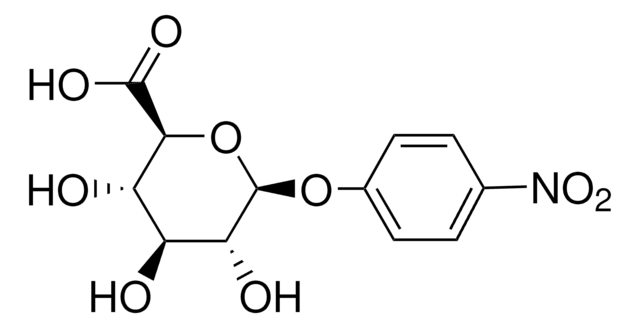18493
MUG Supplement
suitable for microbiology
Synonym(s):
4-Methylumbelliferyl-β-D-glucuronide, 4-Methylumbelliferyl-β-D-glucuronide Supplement, MUGlcU
About This Item
Recommended Products
sterility
sterile
Quality Level
form
powder
shelf life
limited shelf life, expiry date on the label
application(s)
agriculture
environmental
food and beverages
microbiology
storage temp.
2-8°C
suitability
Escherichia coli
coliforms
SMILES string
O[C@@H]1[C@@H](O)[C@H](O)[C@@H](C(O)=O)O[C@H]1OC2=CC(OC(C=C3C)=O)=C3C=C2
InChI
1S/C16H16O9/c1-6-4-10(17)24-9-5-7(2-3-8(6)9)23-16-13(20)11(18)12(19)14(25-16)15(21)22/h2-5,11-14,16,18-20H,1H3,(H,21,22)/t11-,12-,13+,14-,16+/m0/s1
InChI key
ARQXEQLMMNGFDU-JHZZJYKESA-N
Looking for similar products? Visit Product Comparison Guide
Application
Components
4-Methylumbelliferyl ß-D-glucuronide (MUG) 50.0 mg
Storage Class Code
11 - Combustible Solids
WGK
WGK 3
Flash Point(F)
Not applicable
Flash Point(C)
Not applicable
Personal Protective Equipment
Choose from one of the most recent versions:
Already Own This Product?
Find documentation for the products that you have recently purchased in the Document Library.
Customers Also Viewed
Our team of scientists has experience in all areas of research including Life Science, Material Science, Chemical Synthesis, Chromatography, Analytical and many others.
Contact Technical Service









